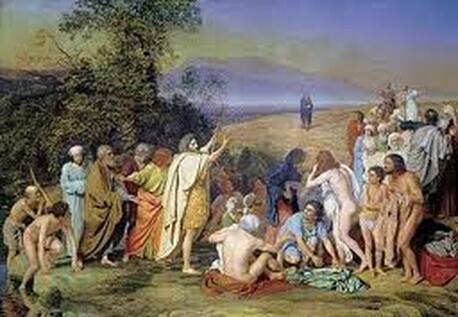The Gospel According to St. Matthew
The King James Bible
|
Matthew 12:15-37
Is Jesus from Beelzebub? 15But when Jesus knew it, he withdrew himself from thence: and great multitudes followed him, and he healed them all; 16And charged them that they should not make him known: 17That it might be fulfilled which was spoken by Esaias the prophet, saying, 18Behold my servant, whom I have chosen; my beloved, in whom my soul is well pleased: I will put my spirit upon him, and he shall shew judgment to the Gentiles. 19He shall not strive, nor cry; neither shall any man hear his voice in the streets. 20A bruised reed shall he not break, and smoking flax shall he not quench, till he send forth judgment unto victory. 21And in his name shall the Gentiles trust. 22Then was brought unto him one possessed with a devil, blind, and dumb: and he healed him, insomuch that the blind and dumb both spake and saw. 23And all the people were amazed, and said, Is not this the son of David? 24But when the Pharisees heard it, they said, This fellow doth not cast out devils, but by Beelzebub the prince of the devils. 25And Jesus knew their thoughts, and said unto them, Every kingdom divided against itself is brought to desolation; and every city or house divided against itself shall not stand: 26And if Satan cast out Satan, he is divided against himself; how shall then his kingdom stand? 27And if I by Beelzebub cast out devils, by whom do your children cast them out? therefore they shall be your judges. 28But if I cast out devils by the Spirit of God, then the kingdom of God is come unto you. 29Or else how can one enter into a strong man's house, and spoil his goods, except he first bind the strong man? and then he will spoil his house. 30He that is not with me is against me; and he that gathereth not with me scattereth abroad. 31Wherefore I say unto you, All manner of sin and blasphemy shall be forgiven unto men: but the blasphemy against the Holy Ghost shall not be forgiven unto men. 32And whosoever speaketh a word against the Son of man, it shall be forgiven him: but whosoever speaketh against the Holy Ghost, it shall not be forgiven him, neither in this world, neither in the world to come. 33Either make the tree good, and his fruit good; or else make the tree corrupt, and his fruit corrupt: for the tree is known by his fruit. 34O generation of vipers, how can ye, being evil, speak good things? for out of the abundance of the heart the mouth speaketh. 35A good man out of the good treasure of the heart bringeth forth good things: and an evil man out of the evil treasure bringeth forth evil things. 36But I say unto you, That every idle word that men shall speak, they shall give account thereof in the day of judgment. 37For by thy words thou shalt be justified, and by thy words thou shalt be condemned. |
Margin notes:
"When Jesus knew it." (12:15) - Refers to Jesus knowing about the Pharisees plotting to kill Him. See the last verse of lesson 22 (Matthew 12:14). "Charged them that they should not make him known." (12:16) - Jesus asked them not to tell who He was because it was to early to reveal His true nature. "Esaias." (12:17) - Greek name for the prophet Isaiah (meaning Jehovah is salvation) who died in 681 BC. Considered the greatest Old Testament prophet, Isaiah wrote "The Book of the Prophet Isaiah" which spoke out against hypocrisy (Isaiah 29:13) and prophesized the coming of the Messiah (Isaiah 6:15) 700 years before the birth of Christ. He is quoted over 50 times in the New Testament. "Behold my servant, whom I have chosen..." (12:18-21) - A prophesy of the coming Messiah from Isaiah 42:1, written 700 years before the birth of Christ. "He shall shew judgment to the Gentiles." (12:18) - "He will declare justice to the Gentiles." From the second part of Isaiah 42:1. "He shall not strive, nor cry; neither shall any man hear his voice in the streets." (12:19) - From Isaiah 42:2. "Smoking flax shall he not quench, till he send forth judgment unto victory." (12:20) - "A flickering candle will not go out until judgment and victory." This is paraphrased from Isaiah 42:3 showing that the promised Messiah would be a judge and not the military/political leader that many were expecting. "And dumb." (12:22) - "And mute." "This fellow doth not cast out devils, but by Beelzebub." (12:24) - This is not the first time the Pharisees accused Jesus of being in league with devils (Matthew 9:34). "Jesus knew their thoughts." (12:25) - Another miracle. "By whom do your children cast them out?" (12:27) - "By whom do your followers cast them out?" "The kingdom of God is come unto you." (12:28) - Means, the Messiah has come. "He that is not with me is against me." (12:30) - When it comes to Jesus there is no neutrality, you either believe, or you don't. Jesus repeats this message in Mark 9:40, Luke 9:50 and 11:23. "All manner of sin and blasphemy shall be forgiven." (12:31) - God is willing to forgive. "Blasphemy against the Holy Ghost shall not be forgiven." (12:31) - See the "Application thought for the day" below. "The tree is known by his fruit." (12:33) - The tree is a metaphor for people. Jesus considered this teaching so important that He repeated it three other times (Matthew 7:16-17; 7:20; Luke 6:43). "They shall give account thereof in the day of judgment." (12:36) - Jesus is telling us that we will all be judged. |
You can read Luke's account of Jesus casting out this demon in Luke 11:14-20.
New Living Translation
Matthew 12:15-37
Jesus, God's Chosen Servant
15 But Jesus knew what they were planning. So he left that area, and many people followed him. He healed all the sick among them,
16 but he warned them not to reveal who he was.
17 This fulfilled the prophecy of Isaiah concerning him:
18 "Look at my Servant, whom I have chosen.
He is my Beloved, who pleases me.
I will put my Spirit upon him,
and he will proclaim justice to the nations.
19 He will not fight or shout
or raise his voice in public.
20 He will not crush the weakest reed
or put out a flickering candle.
Finally he will cause justice to be victorious.
21 And his name will be the hope
of all the world."
Jesus and the Prince of Demons
22 Then a demon-possessed man, who was blind and couldn't speak, was brought to Jesus. He healed the man so that he could both speak and see.
23 The crowd was amazed and asked, "Could it be that Jesus is the Son of David, the Messiah?"
24 But when the Pharisees heard about the miracle, they said, "No wonder he can cast out demons. He gets his power from Satan, the prince of demons."
25 Jesus knew their thoughts and replied, "Any kingdom divided by civil war is doomed. A town or family splintered by feuding will fall apart.
26 And if Satan is casting out Satan, he is divided and fighting against himself. His own kingdom will not survive.
27 And if I am empowered by Satan, what about your own exorcists? They cast out demons, too, so they will condemn you for what you have said.
28 But if I am casting out demons by the Spirit of God, then the Kingdom of God has arrived among you.
29 For who is powerful enough to enter the house of a strong man like Satan and plunder his goods? Only someone even stronger-someone who could tie him up and then plunder his house.
30 "Anyone who isn't with me opposes me, and anyone who isn't working with me is actually working against me.
31 "So I tell you, every sin and blasphemy can be forgiven-except blasphemy against the Holy Spirit, which will never be forgiven.
32 Anyone who speaks against the Son of Man can be forgiven, but anyone who speaks against the Holy Spirit will never be forgiven, either in this world or in the world to come.
33 "A tree is identified by its fruit. If a tree is good, its fruit will be good. If a tree is bad, its fruit will be bad.
34 You brood of snakes! How could evil men like you speak what is good and right? For whatever is in your heart determines what you say.
35 A good person produces good things from the treasury of a good heart, and an evil person produces evil things from the treasury of an evil heart.
36 And I tell you this, you must give an account on judgment day for every idle word you speak.
37 The words you say will either acquit you or condemn you."
This second Bible text from the "New Living Translation" (Tyndale House, Publishers, Wheaton, Illinois) is a paraphrase and not an accurate word for word translation of the Bible. However, it is a helpful tool when read with the "King James Version."
Matthew 12:15-37
Jesus, God's Chosen Servant
15 But Jesus knew what they were planning. So he left that area, and many people followed him. He healed all the sick among them,
16 but he warned them not to reveal who he was.
17 This fulfilled the prophecy of Isaiah concerning him:
18 "Look at my Servant, whom I have chosen.
He is my Beloved, who pleases me.
I will put my Spirit upon him,
and he will proclaim justice to the nations.
19 He will not fight or shout
or raise his voice in public.
20 He will not crush the weakest reed
or put out a flickering candle.
Finally he will cause justice to be victorious.
21 And his name will be the hope
of all the world."
Jesus and the Prince of Demons
22 Then a demon-possessed man, who was blind and couldn't speak, was brought to Jesus. He healed the man so that he could both speak and see.
23 The crowd was amazed and asked, "Could it be that Jesus is the Son of David, the Messiah?"
24 But when the Pharisees heard about the miracle, they said, "No wonder he can cast out demons. He gets his power from Satan, the prince of demons."
25 Jesus knew their thoughts and replied, "Any kingdom divided by civil war is doomed. A town or family splintered by feuding will fall apart.
26 And if Satan is casting out Satan, he is divided and fighting against himself. His own kingdom will not survive.
27 And if I am empowered by Satan, what about your own exorcists? They cast out demons, too, so they will condemn you for what you have said.
28 But if I am casting out demons by the Spirit of God, then the Kingdom of God has arrived among you.
29 For who is powerful enough to enter the house of a strong man like Satan and plunder his goods? Only someone even stronger-someone who could tie him up and then plunder his house.
30 "Anyone who isn't with me opposes me, and anyone who isn't working with me is actually working against me.
31 "So I tell you, every sin and blasphemy can be forgiven-except blasphemy against the Holy Spirit, which will never be forgiven.
32 Anyone who speaks against the Son of Man can be forgiven, but anyone who speaks against the Holy Spirit will never be forgiven, either in this world or in the world to come.
33 "A tree is identified by its fruit. If a tree is good, its fruit will be good. If a tree is bad, its fruit will be bad.
34 You brood of snakes! How could evil men like you speak what is good and right? For whatever is in your heart determines what you say.
35 A good person produces good things from the treasury of a good heart, and an evil person produces evil things from the treasury of an evil heart.
36 And I tell you this, you must give an account on judgment day for every idle word you speak.
37 The words you say will either acquit you or condemn you."
This second Bible text from the "New Living Translation" (Tyndale House, Publishers, Wheaton, Illinois) is a paraphrase and not an accurate word for word translation of the Bible. However, it is a helpful tool when read with the "King James Version."
Today's questions:
1. Can our sins be forgiven after we die? (12:32)
2. What is the harm in "idle" words? (12:36-37)
If you need copies of past lessons, let me know. I'm happy to send them to you.
Answers: (Do you agree?)
1. No, Jesus isn't saying that our sins will be forgiven "in the world to come." If that were the case, we could all live a life
of sin and wait until we die to seek forgiveness. Everyone will believe in God and ask for forgiveness after death. The time to seek forgiveness is now. The phrase "Neither in this world, neither in the world to come" was simply a well known Jewish expression meaning that a particular thing would never happen, not now, not ever.
2. Words show what is in our hearts. Just like blasphemous or profane words, careless idle words can also hurt because
they come from a heart without faith. Our words will either acquit or condemn us when we are judged. See also James 3:6.
Application thought for the day:
What is blasphemy (12:31)?
Blasphemy is to slander, insult (through words or actions), or speak irreverently of God, His authority, or grandeur. The Old Testament called blasphemy one of the worst sins, punishable by death (Leviticus 24:16). The blasphemy Jesus warns us about in this passage isn't a one-time mistake made in a time of spiritual uncertainty. It is the unrelenting disavowal, insulting, and rejection of God. It will never be forgiven (12:31) because the sinner will never ask for forgiveness. Is this important to know? Mark and Luke also documented Jesus' teachings on blasphemy in Mark 3:28-29 and Luke 12:10. Whenever you see teachings repeated in the Bible, it's because they're important.
What is blasphemy (12:31)?
Blasphemy is to slander, insult (through words or actions), or speak irreverently of God, His authority, or grandeur. The Old Testament called blasphemy one of the worst sins, punishable by death (Leviticus 24:16). The blasphemy Jesus warns us about in this passage isn't a one-time mistake made in a time of spiritual uncertainty. It is the unrelenting disavowal, insulting, and rejection of God. It will never be forgiven (12:31) because the sinner will never ask for forgiveness. Is this important to know? Mark and Luke also documented Jesus' teachings on blasphemy in Mark 3:28-29 and Luke 12:10. Whenever you see teachings repeated in the Bible, it's because they're important.
Free Bible lessons since 2007.
Won't you help us reach more people?
Your donation is greatly appreciated.
Won't you help us reach more people?
Your donation is greatly appreciated.
Thanks to the writings and commentary of John Wesley and Adam Clarke. Also, "The Layman's Bible Study Notebook" by Irving Jensen published by Harvest House Publishing, Irvine, California; the "Life Change Series" published by NavPress Books, Colorado Springs, Colorado; the "Life Application Study Bible" published by Tyndale House Publishing, Carol Stream, Illinois; "The Quest Study Bible" published by The Zondervan Corporation, Grand Rapids, Michigan; "Robertson's New Testament Word Studies"; "The MacArthur Bible Commentary" by John MacArthur published by Thomas Nelson, Nashville, Tennessee; "Wisdom of the Bible" CD by Topics Entertainment, Inc., Renton, Washington for their inspiring pictures; "My utmost for His Highest" by Oswald Chambers published by Barbour publishing, Inc., Uhrichsville, Ohio; The "Treasury of Scriptural Knowledge" by Reuben Archer Torrey; "Hope For Each Day" by Billy Graham published by J. Countryman, a division of Thomas Nelson, Inc., Nashville, Tennessee; "Easton's Bible Dictionary" by Matthew George Easton; "Unger's Bible Dictionary" by Merrill F. Unger, published by Moody Press, Chicago, Illinois; "Halley's Bible Handbook" by Henry H. Halley, Zondervan Publishing House, Grand Rapids, Michigan; "The Living New Testament" published by Tyndale house; "The New Living Translation" published by Tyndale House; BibleGateway.com for all their wonderful links; and of course the "King James Bible." All were critical in putting these lessons together.
© 2024 evolke
© 2024 evolke






